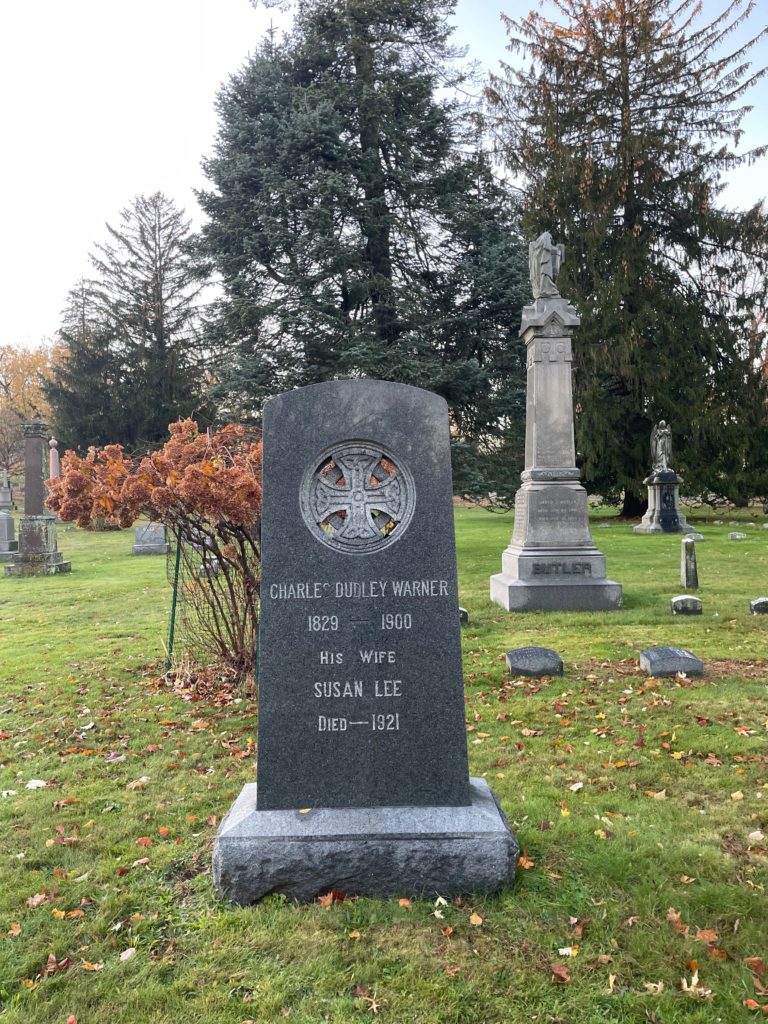Erik Visits an American Grave, Part 1,183
This is the grave of Charles Dudley Warner.

Born in 1829 in Plainfield, Massachusetts, Warner grew up in Charlemont and then the family moved to New York in about 1843. He finished school there and went to Hamilton College. For awhile, he was footloose and moving around, spending time working with surveying parties in Missouri. But eventually, he decided to study the law and he went to law school at the University of Pennsylvania.
By 1856, Warner was practicing law in Chicago. He only did this for about four years, still not satisfied with his life. So he left in 1860 and moved to Hartford, where he went into newspaper editing. Editing and writing would become his vocation. He was the editor of The Hartford Courant, even then the state’s most important newspaper, from 1861 to 1867.
Warner also became a well-known writer, mostly of nonfiction. In 1870, he published My Summer in a Garden, a nonfiction set of essays that he originally published in the Courant that were a combination of humorous anecdotes combined with his love for gardens. For this, he was compared to Washington Irving, which I doubt really holds up but then no one really reads Irving today either. He became a well-known travel writer as well. His next book was 1872’s Saunterings, about his trip to Europe. There was always a market in the U.S. for this kind of thing since the upwardly mobile middle class wanted to do this themselves. Two years later came a travel book on Nova Scotia, Baddeck, and That Sort of Thing. This was a fairly influential book in that it helped establish Cape Breton as a tourist destination. It seems that Alexander Graham Bell was a big fan and Nova Scotia is where he built his big mansion and that’s where he is buried today. He went on to publish travel books about Egypt, the Middle East, the South, southern California (this was the early 1890s, just as it was starting to become a destination), and western Canada. He also edited The American Men of Letters series and contributed a volume on Irving. Always good with nostalgic writing, his memoir, Being a Boy, had popular chapters on the bucolic life of growing up in the country, which as the nation industrialized, had a market by people increasingly wistful for the rural life they had left.
None of this is why we remember Warner today. The single reason he is remembered is the book he coauthored with Mark Twain, 1873’s The Gilded Age: A Tale of Today. He and Twain had become good friends, as Samuel Clemens had made Hartford his home when he had success as a writer. While The Gilded Age is not considered a good book (I’ve never read it and haven’t talked to anyone who has except for professional purposes), it is important because it gave an evocative title to the pretty terrible era in which Warner and Clemens lived, a society that was cheap and rotten at the core, but shiny from a gild of gold over all the festering rot. The book was a novelistic satire of the greed and corruption of the post-Civil War period. Supposedly anyway, the book came about when the Clemens family and Warner family were having dinner and the two men were talking about how bad contemporary novels were. Their wives challenged them to write something better. Not sure they did write anything better, but at least it’s better known.
In 1884 Warner, now quite famous for his association with Twain, not to mention his other writing, joined the editorial staff of Harper’s. Then in 1892, he took over a journal called The Editor’s Study, which is a new one for me. He was the first president of the National Institute of Arts and Letters. He also was the president of the American Social Science Association, a two year term from 1899 to 1901.
Say this for Warner, he could quip. This is probably part of the reason he was such good friends with Twain. Among his sayings include “Everybody complains about the weather, but nobody does anything about it,” which is often attributed to Twain, but is in fact Warner. He also coined “Politics makes strange bedfellows,” which comes from My Summer in a Garden.
Warner died in 1900, collapsing on his daily walk. Heart attack one assumes. Mark Twain was a pallbearer at his funeral. Warner is not that remembered today, but there is a multi-volume edition of his writings out there for those really interested in late nineteenth century American letters.
Charles Dudley Warner is buried in Cedar Hill Cemetery, Hartford, Connecticut.
If you would like this series to visit other presidents of the American Social Science Association, you can donate to cover the required expenses here. Oscar Straus is in Queens and John Graham Brooks is in Milton, Massachusetts. Previous posts in this series are archived here.


